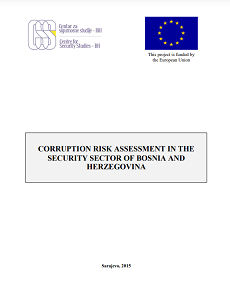Corruption Risk Assessment in the Security Sector of Bosnia and Herzegovina
Corruption Risk Assessment in the Security Sector of Bosnia and Herzegovina
Contributor(s): Denis Hadžović (Editor), Armin Kržalić (Editor), Svjetlana Pavičić (Translator)
Subject(s): Politics, Security and defense, Corruption - Transparency - Anti-Corruption
Published by: Centar za Sigurnosne Studije
Keywords: BiH; security; politics; corruption; transparency; risk assessment; 2015;
Summary/Abstract: The presence of corruption in the security sector is a very serious problem for the society as a whole, since the institutions in the security sector are both objects and subjects in that relationship. As an important consumer of the budget, the security institutions are vulnerable to corrupt behaviour, while on the other hand, they are the main institutions of the government apparatus in the fight against corruption. To what extent are these institutions able to resist the temptation of corruption and to work effectively towards detecting, investigating and prosecuting corruption offences if they themselves are involved in and susceptible to corruption? This study attempts to find a credible answer to this question through an analysis of credible sources and collected qualitative and quantitative data. A qualitative analysis shows that the occurrence of corruption in the security sector is not caused by accumulated problems in the society. Rather, it is the consequence of insufficiently regulated relations and a reflection of the overall situation in the country in transition. In order to assess the proportions of corruption in the security sector, we analysed the norms and practices related to corruption in the security sector. Quantitative data which we obtained through a survey conducted on a representative sample indicate that out of the five areas in the security sector, in the opinion of respondents, corruption occurs most frequently in the police – respondents link as many as 42.8% of a total number of corruption offences known to them to the police. 14% of citizens believe that corruption is most prevalent in the justice sector; 10.9% believe it is most prevalent in the customs/border service; 4.9% believe it occurs most often in the defence sector; and almost a negligible 0.5% believe it is most prevalent in the intelligence sector. In addition to the findings of the analysis of qualitative and quantitative data, the assessment has identified risks of corruptive behaviour in the security sector and gives recommendations for improving the fight against corruption in this sector. We are confident that there are good assumptions for their implementation under the present social and political circumstances, which will not require a long period of time.
Series: Centar za Sigurnosne Studije - MISCELLANEOUS PAPERS
- Page Count: 124
- Publication Year: 2015
- Language: English
- Content File-PDF
- Introduction

